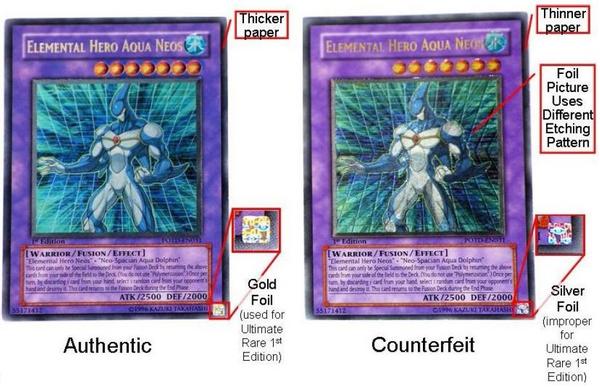UPDATE 1/10/2010: Court rules that Upper Deck counterfeited Yu Gi Oh! cards. Details here.
Los Angeles, CA – In October of 2008, Konami sued Vintage Sports Cards, Inc. in the Central District of California for sales of allegedly counterfeit Yu-Gi-Oh! trading cards (details blogged here). The Court entered a permanent injunction against Vintage and, after taking expedited discovery, Konami discovered that Upper Deck – Konami’s exclusive distributor – was the alleged source of the infringing cards distributed by Vintage.
Upper Deck allegedly was the source of “at least 531,240 counterfeit Rare Cards” provided to Vintage. And in October of 2008, Konami’s attorneys discussed Upper Deck’s role in the distribution of allegedly infringing cards with Upper Deck’s lawyers. During counsels’ communications, Upper Deck’s lawyers allegedly threatened Konami with “mutual assured destruction” through litigation.
Konami then provided Upper Deck with access to the seized cards and subpoenaed records from Upper Deck to determine the scope of the alleged counterfeiting and infringement. One day before responses were due, Upper Deck refused to comply with the subpoena raising an objection of improper service on its California office.
On December 10, 2008, Upper Deck filed suit in the District of Nevada alleging Konami breached its agreements and committed fraud. The complaint also contained causes of action for slander and civil conspiracy arising from Konami’s communications to third parties that Upper Deck provided counterfeit cards to Vintage. In response, on the very next day, Konami terminated its distribution agreement with Upper Deck. Upper Deck then raised the stakes by filing suit in Amsterdam on December 16, “seeking an interim order requiring specific performance of the European version of the parties’ distribution agreement.” Konami then alleged that Upper Deck misrepresented the holdings of the Dutch proceedings in that “the five-page interim order did not decide any issue in this action,” despite Upper Deck’s assertion to the Central District of California.
Konami amended its complaint to add Upper Deck as a co-defendant and moved for preliminary injunction against Upper Deck, which motion was denied without prejudice (details blogged here). Konami then renewed its motion for preliminary injunction against Upper Deck (read here), which injunction was granted.
On February 26, 2009, the Central District of California granted Konami’s preliminary injunction application enjoining Upper Deck from manufacturing, advertising and distributing the Yu-Gi-Oh! cards (read order here). In response, Upper Deck filed suit, in the District of Nevada, against Konami alleging trademark infringement of its hologram mark, in addition to Nevada unfair competition and deceptive trade practices claims. (Ryan Gile blogged here)
And now, as the cherry bomb on top of the “mutual assured destruction” sundae, Upper Deck has filed its counterclaims in the Central District of California (copy available here), wherein it asserts eleven causes of action including breach of contract, breach of implied covenant of good faith and fair dealing, fraud, slander per se, and civil conspiracy. Updates to the fireworks are sure to follow. The case is Konami Digital Entertainment, Inc. v. Vintage Sports Cards, Inc. et al., CV08-06630 VBF (C.D. Cal. 2008).
 Los Angeles Intellectual Property Trademark Attorney Blog
Los Angeles Intellectual Property Trademark Attorney Blog


